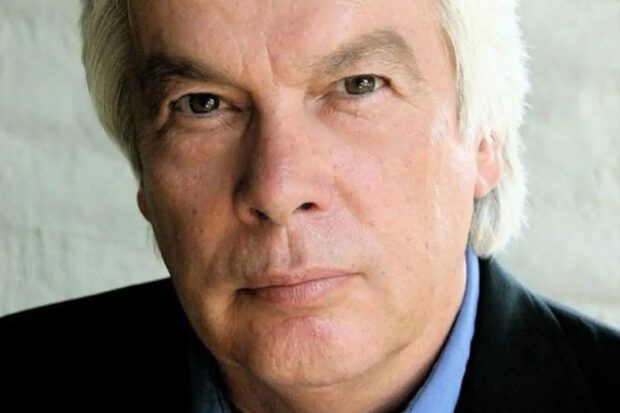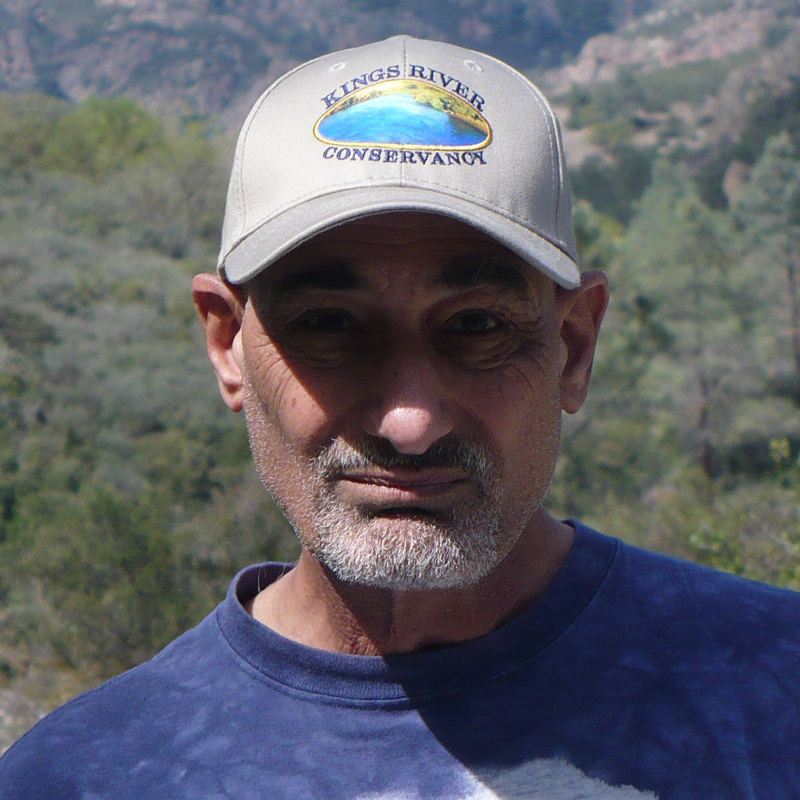
On Nov. 15, Ian Masters will be the keynote speaker at the KFCF/Fresno Free College Foundation annual banquet. Masters hosts the nationally syndicated news analysis radio program Background Briefing, which is carried on KFCF.
Masters, who has produced documentaries for ABC News and Frontline, is a BBC-trained broadcast journalist who has covered national security affairs for more than 30 years on public radio. He has edited features and documentaries including The Secret Life of Plants and Koyaanisqatsi, and worked as a screenwriter and consultant on feature films.
Masters spoke with Community Alliance reporter and KFCF correspondent Vic Bedoian about his life and work.
Vic Bedoian (VB): Ian, you have broad experience in both national and international reporting. How did you get started being a journalist in the first place?
Ian Masters (IM): Well, I was in medical school at the University of Sydney and didn’t like my colleagues. They were all into money, not healing people. And I just thought, I don’t want to do this.
And I got interested in the local university theater and the local university newspaper. I had some friends who had a sailboat in Sydney Harbor, and they worked for a newsreel company in those days. I would moonlight with them. I learned how to become an assistant cameraman, how to load film magazines and how to put microphones on people and how to do interviews.
Then I saw some French and European movies, what was called the New Wave, and Ingmar Bergman films, and wanted to get into the movie business. So, I got a scholarship to a French film school in Paris. I had no money, so I went around Sydney Harbor and asked the captains of all of the various ships there whether I could work my passage to Europe.
I worked my passage across the Pacific through Panama, and this was in 1964. There was a riot that took place against the American occupier, if you will. And it was my first introduction to a revolution, albeit pretty much a storm in a teacup.
Then I got to the U.S., and I only had $50 on me, and they wouldn’t let me ashore because I didn’t have a return ticket or a hotel reservation. I eventually got another ship in Canada to the U.K. and then went to Paris. I got a job as an assistant newsreel cameraman. So that was how I got into journalism. And then eventually I got a job at the BBC as an editor.
VB: What are some of the more interesting or eventful happenings that you recall in your international reporting days?
IM: Well, I suppose certainly being in France in the 60s was pretty dramatic. In 1968, there were the student riots, that was all very dramatic. There were lots of wars, Vietnam, the Six Day war.
I remember also being in Greece when the colonels took over. I was on vacation with a bunch of other reporters. We were on the island of Rhodes watching a Paul Newman movie, and we saw the newsreels of the colonels and the generals. And it was literally a flashback to the 1930s to Mussolini, Hitler.
We were just laughing at this ridiculous time warp, and then I noticed all the Greeks in the theater started to move away from us. Then these flashlights came on, and the Greek police or military hauled us up, beat the hell out of us, and put us on a fishing boat to Turkey. So, we got deported.
That bit of a taste of being in Greece under military occupation is certainly something that I can feel the echoes of at this moment here in this country. [Trump’s] already got his private army in ICE, but if he can get the military on his side and they start rounding up people, then we are in that situation depicted in the Brazilian movie I’m Still Here.
VB: Well, I think a lot of people have that same feeling. And we’re all wondering if it’s already gone too far, whether the ICE troops and the U.S. Army have already signed on to the administration’s agenda. What do you think?
IM: He’s firing all the generals and the heads of various agencies, including the Black chairman of the Joint Chiefs of Staff. Not only is [Trump] racist, he’s going to have a bunch of loyal lackeys in the Pentagon.
You better believe that the officers in the military hate Defense Secretary [Pete] Hegseth because he’s such a joke. But Trump will find enough of them if he’s in there long enough over the next three-plus years; he could end up with his own military, which is a requisite for all dictators.
VB: Your podcast, Background Briefing with Ian Masters provides a comprehensive review and in-depth analysis of national and world events and trends. How do you put that all together on such a timely basis?
IM: Doing a one-hour program five days a week, and having to deliver it by 2 p.m. Pacific every day is exhausting and a lot of work. We have to find three or more people every day to cover the important stories in the news and make sure you get the best, most qualified person you can find anywhere in the world.
I’ve studied the issues, know the history, know the context, and then I do the interviews. I have a very small crew.
I have a new assistant producer who’s fantastic. She’s a 28-year-old millennial, Sasha Cohen. I’ll have her do a segment or two of the program and interview people from the perspective of Gen Z. So, I’m hoping to expand the audience of the program.
VB: You have been an independent journalist for many years, doing programs on KPFK and KPFA and many other radio stations. What was the trajectory between working for the BBC, a mainline media organization, to being independent and trying to make it on your own?
IM: When I worked for the BBC, I went through a training period where they did thorough training on film and documentary production and everything about journalism. I was more on the film side from the very beginning.
And then I met and worked for some really interesting people, including the Monty Python people. I trained Terry Jones and Eric Idol in film editing. And they wanted me to join them. Being too busy, I said no.
VB: When you moved on from the BBC, what did you do?
IM: I became a film editor in the motion picture business. I did a movie in Australia called Ned Kelly that starred Mick Jagger. On the way I dropped off in Los Angeles and saw my younger brother who was living with Liza Minelli.
Once I finished the film in Australia I decided to go back to LA because it was so exciting when I was there. I worked for a while in the film business and wrote some screenplays.
I got back into journalism with this wonderful reporter, a guy called Clete Roberts, who goes back to World War II and Edward R. Murrow. We made a bunch of documentaries and news pieces.
I got involved with Paul Newman who financed a film with this Washington group called the Center for Defense Information. So, I did this documentary for the Center for Defense Information, and got really educated about nuclear strategy, arms control, nuclear weapons and then got to know all these characters in the Dr. Strangelove world.
VB: Is that what got you involved with radio work and Pacifica’s LA station KPFK?
IM: I got involved with the nuclear freeze movement, as well. They offered me a slot to talk about nuclear issues for two hours on Sunday. The program was called National Security. It was an ironic title, meaning national security in the broadest definition, not just about the military; it’s about our economy, our society, our soft power. I had access to all the top people in the United States in strategy and arms control and defense, people like Kissinger and others.
VB: I think one of the great values of Background Briefing is the broad variety of experiences that you’ve had and the people that you’ve been in touch with. You have an amazing Rolodex, and I think that’s one of the things that listeners really appreciate, because you get down to the roots of issues. You talk to people who have made these kinds of national security and economic decisions.
IM: Right. And these are the very people that Trump and Hegseth and Kash Patel and Tulsi Gabbard are firing. They’re the people that I’ve known and developed relationships over the years.
This is the death of expertise that we’re living through. It’s shocking the institutional knowledge that’s being destroyed. Trump’s talk recently to the generals and the admirals; it’s frightening that this guy has his finger on the button.
So, [that’s] more reason to try and talk to people who’ve been on the inside and particularly talk to people that have been in the room. They know exactly who he is and what his failures are.
VB: We have a media environment where so many people are in information silos. How do you communicate this sense of urgency that you have to a wider population than the folks who are already opposed to Trump and Project 2025?
IM: I don’t want to spend my life preaching to the choir. I would like to have a broader audience, but on the other hand, nobody in the mainstream media’s going to hire me because I’m not interested in that ridiculous false equivalence of, on the one hand and on the other.
I’m not interested in playing that game because I don’t think it works. I don’t think anybody seriously thinks that reporters are unbiased.
What you do is you try to be honest and skeptical and not ideological, not have preconceived ideas, just trying to seek out information. So that’s the mission.
And it’s frightening and difficult in post-truth America since we now have this attack on reality itself, where there’s no consensus about what is real, what is true.
The KFCF/Fresno Free College Foundation celebrates their 50th anniversary at the 2025 Annual Banquet featuring Masters as the guest speaker. The banquet is Nov. 15 at the Unitarian Universalist Church (2672 E. Alluvial Ave., Fresno) beginning at 5:30 p.m. (see the ad on page xx).
Background Briefing with Ian Masters is available on KFCF 88.1 FM Monday–Thursday at 3 p.m. and online at backgroundbriefing.org.

